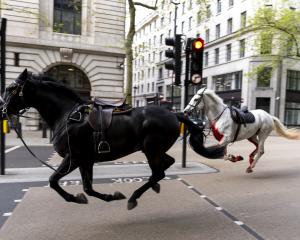British newspaper editors, in crisis after revelations of illegal phone-hacking and other ethical lapses, have recognised that Fleet Street has to mend its ways but appealed to the government not to crush Britain's cherished free speech with draconian laws.
"We understand that we have to stand together, we have to clean our house," Financial Times Editor Lionel Barber told a Thomson Reuters debate in London on the future of the press.
"Or else we face statutory regulation which nobody wants."
Britons' patience with their misbehaving press, tested by a string of scandals where tabloid newspapers published wildly inaccurate stories or splashed sordid details of private lives on front pages, snapped this summer when the top-selling News of the World admitted that it had illegally hacked the voicemail of murdered schoolgirl Milly Dowler while hunting stories.
Rupert Murdoch, the billionaire owner of the News of the World, closed down the newspaper, apologised and his company offered a 3 million pound damages payout in that one case. But other victims of tabloid phone-hacking want tougher laws and Prime Minister David Cameron has ordered a public inquiry into press ethics.
Top lawyers, editors and politicians agreed during Tuesday's debate on "The Press We Deserve" that Britain's existing Press Complaints Commission, a voluntary self-regulatory body, had failed in its duty to keep the press honest but differed sharply over the solution.
Reuters Editor-at-large Sir Harold Evans, hosting the debate, said the British press was in its greatest danger since two journalists were jailed for not revealing their sources in 1963.
"The expose (about phone hacking) came from the press, yet the press face very big restrictions", he said.
Britain already has some of the world's toughest libel laws - a constant thorn in the side of editors who want to write stories exposing the dirty dealings of the elite.
Oligarchs from the former Soviet Union are particularly fond of using the libel law to stop London-based reporters from digging into their pasts.
John Micklethwait, editor of The Economist, said libel laws affected him every week because Britain was the worst place in the world bar Singapore for writing stories about the rich and powerful. He called for a deal under which British media would surrender ground on tougher privacy laws in exchange for a loosening of libel laws.
City University Professor of Journalism and media commentator Roy Greenslade, who has previously worked for Murdoch, agreed that press regulation needed to be changed but cautioned: "What we have to be careful about, in the feeding frenzy on the press, is that we don't do something utterly illiberal. We need to allow the press to misbehave, it needs to be rough and ready and raw."
Former Deputy Prime Minister John Prescott, who describes himself as a phone-hacking victim, bluntly demanded "major change" in press regulation during the debate.
In a surprising aside, he also said former News International executive Rebekah Brooks played a pivotal role in the government of Prime Minister Tony Blair because of her closeness to both Blair and his Finance Minister Gordon Brown.
Brooks, a close confidante of Murdoch's, used to edit the News of the World and went on to take a senior executive position in News International, the company which owned the best-selling tabloid. She resigned after the scandal broke and has since been questioned by police.
Backing calls for tough statutory regulation, Christopher Bland, a former chairman of the board of BBC governors, told the assembled editors that it was "useless to fart against the thunder" by resisting a new regulatory authority set up at arm's length from the government - the model used by the British national broadcaster.
"Editors ought to concentrate on making a statutory form of regulation as good as it could be," he said.
But the overwhelming consensus of the voices at the debate in Whitehall's Banqueting Hall - scene of the execution in 1649 of English king Charles I - was that Britain's raucous press needed a stronger and better-funded system of self-regulation rather than state intervention.
"The most important thing is that whatever organisation follows is not controlled by the state," said James Harding, editor of The Times, which is owned by Murdoch.
"You don't want to be in any way in a position where David Cameron, (opposition leader) Ed Miliband and (deputy Prime Minister) Nick Clegg can control the press. It needs two things, real investigative powers and real punitive powers."












